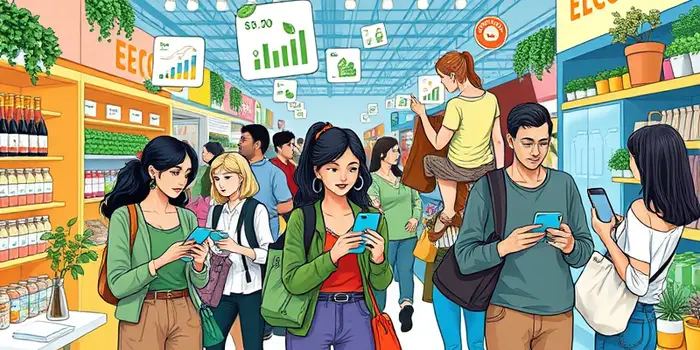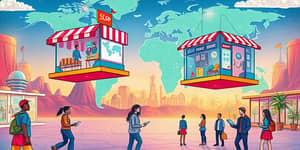
As 2025 unfolds, consumer behavior is reshaping market landscapes at lightning speed. Brands and retailers must stay vigilant to both macroeconomic forces and shifting priorities that define modern purchasing patterns. From eco-conscious choices to digital empowerment, these evolving trends will determine winners and challengers in a fiercely competitive environment.
In this comprehensive analysis, we delve into the most critical data points and emerging movements so brands can craft strategies that resonate and drive growth.
Environmental stewardship has leapt from niche to mainstream. According to recent market research, 58% of consumers will pay more for eco-friendly products, with Millennials leading at 60% and Gen Z close behind at 58%. Urban shoppers show even stronger commitment, as 60% admit they’ll invest extra for sustainable goods. Simultaneously, 43% of buyers demand brands transparently share sourcing and production details, elevating corporate responsibility from buzzword to baseline expectation.
Though secondhand purchasing saw a 24% drop since Q3 2021—just 11% bought used items online in the past week—the underlying desire for sustainability endures. Consumers often trade reusing for proven green practices when quality and convenience align. This renewed focus on long-term impact underscores the importance of integrating circular principles into every product lifecycle.
Inflation remains a top concern, with prices outpacing wage gains in many regions. A striking 78% of shoppers report consolidating purchases, maximizing rewards points, or chasing deals to stretch their budgets. Nearly half of U.S. consumers—43%—cut non-essential spending in early 2025, while 40% have traded down to generic or store-brand alternatives.
The result is a palpable tug-of-war: shoppers pursue high-value essentials while deprioritizing discretionary categories. Monthly U.S. spending dipped by 0.1% in May 2025, reflecting the growing pressure on household wallets. Brands that balance value with brand integrity—through subtle bundling or loyalty perks—stand to retain share without eroding perception.
Brand loyalty is under siege. Over half of consumers who endure a negative experience reduce their spending, while positive interactions drive repeat purchases and word-of-mouth advocacy. With expectations at an all-time high, frictionless service and personalized outreach can mean the difference between retention and defection.
As shoppers become less forgiving, companies need proactive policies around returns, real-time support, and consistent engagement across touchpoints. Failing to adapt risks amplifying churn, while a seamless experience fosters an ongoing emotional connection that money alone cannot buy.
Digital channels continue their meteoric rise. Social media not only fuels discovery but increasingly influences final purchase decisions through targeted ads and influencer partnerships. To optimize acquisition costs, brands weave omnichannel narratives that blend online browsing with in-store experiences, achieving synergy and deeper consumer engagement.
At the same time, Buy Now, Pay Later (BNPL) services are exploding in popularity among Gen Z and Millennials, offering flexibility that traditional credit lacks. Meanwhile, shoppers demand advanced personalization but remain wary of overreach—control over data and transparent opt-in mechanisms are now table stakes.
The Core Consumer Price Index (CPI) illustrates the tug between rising basics and easing energy costs. In May 2025, CPI climbed 0.1% month-over-month and 2.4% year-over-year. Food prices soared by 2.9% over twelve months, while energy costs fell by 3.5%. Shelter expenses and groceries are squeezing budgets, redirecting demand toward discount-driven formats.
These dynamics push consumers to prioritize essential categories and hunt for savings, making strategic pricing and targeted promotions indispensable tools for maintaining volume without sacrificing margins.
Brands must understand which segments are contracting and which enjoy renewed vitality. The table below highlights pivotal areas shaping 2025’s consumer spend.
The resale and secondhand market persists at an 11% weekly participation rate, signaling potential fatigue in online thrift cycles. Meanwhile, supply-chain bottlenecks endure but inspire innovative strategies such as local sourcing, modular manufacturing, and creative commerce collaborations.
More than ever, consumers crave authentic local connections. Brands that foster community-level relationships—through pop-up events or hyper-local marketing—forge deeper loyalty than those relying solely on nationwide campaigns.
To thrive amidst these shifting sands, companies should consider:
Optimizing for evolving search patterns can capture intent-driven audiences seeking cost savings or eco-friendly solutions. Consider queries like “best eco-friendly products 2025” or “how to save money on groceries inflation” to connect with target segments. Leveraging real-time analytics ensures content remains fresh as consumer priorities pivot.
As the landscape evolves, brands should monitor several developing areas:
In 2025, success hinges on agility and empathetic engagement. Companies that listen, adapt, and act with both purpose and pragmatism will not only weather economic headwinds but also build enduring bonds with consumers.
By understanding these vital trends and applying targeted strategies, brands can transform uncertainty into opportunity, ensuring relevance and growth in an ever-changing marketplace.
References













